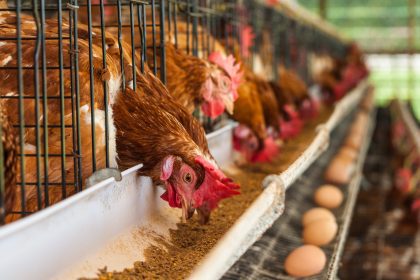As the holiday season approaches, grocery shopping can already be a daunting task. This year, however, shoppers are facing an additional challenge: a nationwide egg shortage that has left many feeling anxious. Reports of empty shelves and skyrocketing prices have emerged from various cities, including Chicago, Kansas City, and Colorado, raising concerns among consumers.
The current state of egg availability
Many shoppers have taken to social media platforms like Reddit to share their experiences with the egg shortage. One user noted, “Noticed that Trader Joe’s was almost completely out of eggs (Chicago) when I went shopping yesterday, assumed it was a pre-Thanksgiving thing.” Another user from Colorado lamented, “Damn we’re at $8/dozen in Colorado. I have my own backyard flock though so haven’t had to buy eggs in a year.”
The shortage isn’t limited to specific regions or store chains. Major retailers across the country report significant challenges in maintaining consistent egg supplies. Local farmers’ markets, typically a reliable alternative source, are also experiencing unprecedented demand as consumers seek alternatives to traditional grocery stores.
Understanding the cause
The primary culprit behind the egg shortage appears to be the ongoing outbreak of avian influenza, specifically the highly pathogenic avian influenza (HPAI) A(H5) viruses. According to a statement from the Wildlife Management Institute, the virus has been detected in various outbreaks across the United States since January 2022. As of November 7, 2024, there have been 1,198 outbreaks reported in 48 states.
The rapid spread of avian influenza has forced farmers to cull millions of birds, creating a devastating impact on egg production capabilities. Unlike previous outbreaks, this strain has shown remarkable persistence, affecting both commercial and backyard flocks throughout the year, rather than following seasonal patterns.
The impact of avian flu on egg production
Experts warn that the situation is worsening as the holiday season approaches. Dr. Sam Scarpino, director of AI and life sciences at Northeastern University, stated, “From ducks and geese in Hawaii and dairy cows in California to human cases in the U.S. and a severe human infection in Canada, it’s clear that the avian influenza outbreak is getting worse, not better.”
Commercial egg producers have implemented stringent biosecurity measures to protect their flocks, but these precautions have added to production costs. These increased expenses, combined with reduced supply, have contributed to the dramatic price increases consumers are experiencing at retail locations nationwide.
Economic implications for consumers and businesses
The ripple effects of the egg shortage extend beyond individual consumers. Restaurants, bakeries, and food manufacturers are all grappling with the challenge of maintaining production while managing increased costs. Some businesses have been forced to modify their menus or recipes, while others have absorbed the higher costs to maintain customer satisfaction during the crucial holiday season.
Small business owners, particularly those specializing in baked goods, report significant impacts on their operations. Local bakeries are exploring creative solutions, including reformulating recipes and investigating egg alternatives, to maintain production without compromising quality.
The rise of alternative protein sources
The current shortage has accelerated interest in plant-based egg alternatives, leading to increased sales of products like JUST Egg and other vegan options. Major retailers report growing demand for these alternatives, particularly among consumers who previously relied exclusively on traditional eggs.
This shift has prompted discussions about food security and the importance of diversifying protein sources in the American diet. Nutritionists and food security experts suggest that this shortage might serve as a catalyst for longer-term changes in consumption patterns.
What this means for holiday baking
With Christmas just weeks away, many home bakers are left wondering how they will manage without eggs. Fortunately, there are several egg substitutes that can be used in baking. Common alternatives include unsweetened applesauce (use 1/4 cup to replace one egg), mashed bananas (one ripe banana can substitute for one egg), aquafaba (the liquid from canned chickpeas can replace egg whites; three tablespoons equals one egg), and silken tofu (blend 1/4 cup to replace one egg).
Each substitute brings its own unique properties to recipes. For instance, applesauce works well in moist baked goods like cakes and muffins, while aquafaba excels in meringues and other recipes requiring whipped egg whites. Understanding these differences can help home bakers choose the most appropriate substitute for their specific recipes.
Impact on traditional holiday recipes
Many beloved holiday recipes rely heavily on eggs, from classic sugar cookies to rich custard-based desserts. Professional chefs and food scientists have been working to develop modified versions of traditional recipes that maintain the familiar taste and texture while using fewer eggs or egg alternatives.
Some traditional recipes can be successfully adapted by:
- Reducing the number of eggs while increasing other binding ingredients
- Using commercial egg replacers specifically designed for baking
- Combining different egg alternatives to achieve desired results
- Adjusting cooking times and temperatures to accommodate substitutions
Preparing for the holidays amidst shortages
As we navigate the challenges of this egg shortage, it’s essential to plan ahead. Early morning shopping trips often yield better results, as stores typically restock overnight. Building relationships with local farmers and joining community supported agriculture (CSA) programs can provide more reliable access to eggs when available.
Consumers are also encouraged to:
- Monitor local store inventories through apps and websites
- Consider joining egg-sharing cooperatives in their communities
- Learn proper storage techniques to extend egg freshness
- Develop a network of alternative suppliers
Long-term solutions and industry adaptations
The egg industry is responding to these challenges by investing in more resilient production methods and improved biosecurity measures. Some farmers are exploring innovative approaches to flock management, including:
- Implementation of advanced monitoring systems
- Development of more disease-resistant breeding programs
- Investment in alternative housing systems
- Expansion of organic and free-range operations
Looking ahead
The current egg shortage presents significant challenges, but it has also sparked innovation in both commercial and home kitchens. As we adapt to these circumstances, the situation offers an opportunity to explore new ingredients and cooking methods that might otherwise have gone undiscovered.
While the immediate future may continue to present challenges, the resilience shown by producers, businesses, and consumers suggests that creative solutions will emerge. Through careful planning, openness to alternatives, and community cooperation, families can still enjoy their traditional holiday celebrations, even if some recipes require adaptation.
The key to successfully navigating this shortage lies in remaining flexible and viewing it as an opportunity to experiment with new ingredients and techniques. By sharing information and solutions within communities, we can help ensure that everyone has access to the resources they need to maintain their holiday traditions, even in challenging circumstances.














